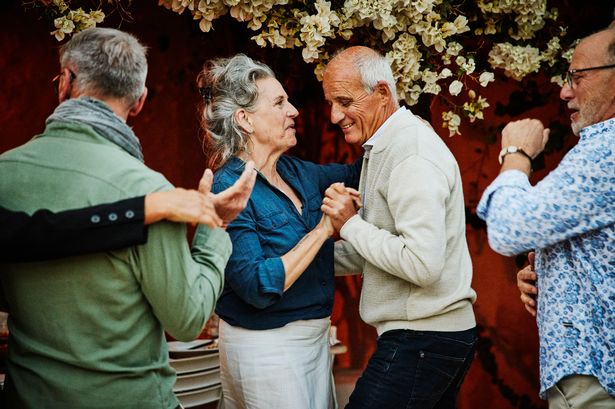World
Social Activities Shown to Reverse Frailty in Older Men

A recent study conducted by researchers at Newcastle University reveals that engaging in social activities can significantly reduce the risk of frailty in older men. The findings indicate that maintaining social connections and participating in various leisure activities can even reverse early signs of frailty, a condition defined by diminished physical and mental resilience.
The research, published in the American Journal of Epidemiology, examined data from over 2,000 men aged 65 and older who were assessed eight years apart. The study aimed to explore the relationship between social interactions, loneliness, and frailty. Participants provided detailed information regarding their social lives, including time spent with family and friends, involvement in community activities, and engagement in hobbies such as reading and dining out.
Among the men surveyed, who were part of the long-term British Regional Heart Study, a notable finding emerged: those who reported a higher level of social activity at the initial assessment had a 31% lower risk of developing frailty. Furthermore, men who increased their social interactions over the eight-year period experienced a 23% reduction in frailty risk.
Importance of Social Connections
The research highlights the critical role that social engagement plays in health outcomes for older adults. Senior author Sheena Ramsay, Professor of Public Health and Epidemiology at Newcastle University, stated, “Our study shows that frailty is not inevitable. Some individuals recover from early stages of frailty – becoming more socially active could be one of the factors that can make this happen.”
Dr. Ziyi Cai, the study’s first author, emphasized the benefits of social connections, noting that individuals with strong social networks are more likely to receive support for healthier lifestyles and access to healthcare services. In contrast, those who experience isolation may struggle with physical activity and healthcare access, increasing their risk of frailty.
The findings also indicate that loneliness, both at the beginning of the study and as it progressed, was associated with a heightened risk of developing frailty.
Broader Implications for Health
The research aligns with the growing body of evidence indicating that engaging in social activities is beneficial for overall health. Sonya Babu-Narayan, Clinical Director at the British Heart Foundation, remarked, “This study adds to the evidence that social activities are good for our health, while loneliness and isolation can be detrimental.”
In addition to fostering social connections, experts recommend incorporating physical exercise, such as resistance training, and maintaining proper nutrition as crucial factors in reducing frailty. There is an increasing emphasis on “social prescribing” within the National Health Service (NHS), which encourages individuals to participate in local activities to enhance their well-being.
According to the British Geriatrics Society, approximately one in ten individuals over the age of 65 experiences frailty, with the prevalence rising to about a quarter among those aged 85 and older.
These findings highlight the importance of fostering age-friendly communities that promote social engagement and support networks, which can play a vital role in combating frailty and improving the quality of life for older adults.
-

 Health2 months ago
Health2 months agoNeurologist Warns Excessive Use of Supplements Can Harm Brain
-

 Health2 months ago
Health2 months agoFiona Phillips’ Husband Shares Heartfelt Update on Her Alzheimer’s Journey
-

 Science2 days ago
Science2 days agoBrian Cox Addresses Claims of Alien Probe in 3I/ATLAS Discovery
-

 World2 months ago
World2 months agoCole Palmer’s Cryptic Message to Kobbie Mainoo Following Loan Talks
-

 Entertainment3 months ago
Entertainment3 months agoLove Island Star Toni Laite’s Mother Expresses Disappointment Over Coupling Decision
-

 Entertainment3 months ago
Entertainment3 months agoEmmerdale Faces Tension as Dylan and April’s Lives Hang in the Balance
-

 Entertainment2 months ago
Entertainment2 months agoMajor Cast Changes at Coronation Street: Exits and Returns in 2025
-

 Entertainment3 months ago
Entertainment3 months agoKerry Katona Discusses Future Baby Plans and Brian McFadden’s Wedding
-

 Lifestyle2 months ago
Lifestyle2 months agoEngland Flags Spark Controversy This Summer: A Cultural Debate
-

 Entertainment2 months ago
Entertainment2 months agoMasterChef Faces Turmoil as Tom Kerridge Withdraws from Hosting Deal
-

 World4 weeks ago
World4 weeks agoMassive Sinkhole Opens in Bangkok, Swallowing Cars and Causing Chaos
-

 World1 month ago
World1 month agoMichelle Tsiakkas Opens Up About Jamie Borthwick Before BBC Exit









